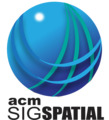 | ACM SIGSPATIAL 2022: 30th ACM International Conference on Advances in Geographic Information Systems Seattle, WA, United States, November 1-4, 2022 |
| Conference website | https://sigspatial2022.sigspatial.org/ |
| Submission link | https://easychair.org/conferences/?conf=sigspatial2022 |
| Abstract registration deadline | June 10, 2022 |
| Submission deadline | June 17, 2022 |
| Acceptance notification | August 22, 2022 |
The ACM SIGSPATIAL International Conference on Advances in Geographic Information Systems 2022 (ACM SIGSPATIAL 2022), the thirtieth edition, will be held in Seattle, USA, in November 2022. The conference began as a series of symposia and workshops starting in 1993 with the aim of bringing together researchers, developers, users, and practitioners in relation to novel systems based on geospatial data and knowledge, and fostering interdisciplinary discussions and research in all aspects of geographic information systems. The conference provides a forum for original research contributions covering all conceptual, design, and implementation aspects of geospatial data ranging from applications, user interfaces, and visualization to data storage and query processing and indexing. The conference is the premier annual event of the ACM Special Interest Group on Spatial Information (ACM SIGSPATIAL). Researchers, students, and practitioners are invited to submit their contributions to ACM SIGSPATIAL 2022.
Submission Guidelines
Paper Format
Manuscripts should be submitted in PDF format and formatted using the ACM camera-ready templates available at http://www.acm.org/publications/proceedings-template. Submissions to ACM SIGSPATIAL are single-blind -- i.e., the names and affiliations of the authors should be listed in the submitted version.
Research, Systems and Industrial Experience Papers
Authors are invited to submit original, unpublished research papers that are not being considered for publication in any other forum. In addition to regular research papers, authors are invited to submit systems papers, which focus on novel system architectures and software applications, and industrial experience papers, which describe original industrial experiences, challenges, and practical applications. For these papers, authors should append “(Systems Paper) ” or “(Industrial Paper)” to the title, respectively. Submissions are limited to 10 pages, with up to 2 additional pages to be used as an Appendix. The Appendix should only contain additional information the authors feel would be helpful to justify claims made in the paper, e.g., proofs of lemmas and theorems, additional experimental results to further illustrate claims from the experimental results section, etc. The Appendix must be clearly marked as such and should appear at the end of the paper after the references. However, the papers are required to be self-contained within the 10 pages. Reviewers will be instructed to treat the Appendix as optional. They can choose to read it at their own discretion, and the same is expected for the readership with respect to the accepted papers. Submissions that are longer than 10 pages without a clearly marked Appendix or longer than 12 pages with an Appendix will be administratively rejected without any technical reviews. Based on the evaluations from the reviewers, the Program Committee may recommend that certain papers are accepted as 4-page poster papers for poster presentation. Both full and poster papers will appear in the conference proceedings.
Vision Papers
Authors are invited to submit papers describing a visionary proposition foreseeing future directions and compelling research opportunities for the SIGSPATIAL community. Vision papers will be evaluated and selected on their potential of expanding current SIGSPATIAL research agenda by defining new research topics and problems with transformative-impact potential. Authors should not be bound by existing technologies or datasets, but rather look further ahead exploring out-of-box (blue sky) thinking, paradigm change, and quantum leap in knowledge. For instance, papers from 10-20 years ago foreseeing and proposing eco-routing and ride-sharing (and all the technical challenges they would bring) would have been “visionary”, as would papers today presenting opportunities for possibly transdisciplinary work expanding SIGSPATIAL’s research horizon on impactful issues such as quantum computing, climate change, spatial aspects of responsible computing research, and spatial data science for societal good. Papers proposing slightly better solutions to well-studied problems (or variations thereof) with known solutions are not relevant and should not be submitted to this track. Submissions to the Vision Paper track should follow the same formatting as regular papers but are limited to 4 pages and “(Vision Paper)” should be appended to its title. Accepted vision papers will appear in the conference proceedings, and pending confirmation, the best submission(s), will be eligible for partial travel grants.
Demonstration Papers
Authors are invited to submit demo papers describing original systems for demonstration presentation at the conference. Submissions are limited to 4 pages and “(Demo Paper)” should be appended to the title. Accepted demo papers will appear in the conference proceedings.
List of Topics
Suggested topics of interest include, but are not limited to, the following:
- Spatial Intelligence
- Autonomous Vehicles
- Geospatial Computer Vision Applications
- Geospatial AI Infrastructure
- Intelligent Transportation
- Location Business Intelligence
- Personalized Geospatial Recommendation Systems
- Smart Cities
- Spatial Knowledge Graphs
- Spatial Big Data
- Spatial Analysis and Integration
- Spatial Data Mining and Knowledge Discovery
- Spatial Data Quality and Uncertainty
- Spatial OLAP, and Decision Support
- Spatial Query Processing and Optimization
- Spatio-Temporal Data Analysis
- Spatio-Temporal Data Management
- Spatio-Temporal Disease Spread Modeling
- Visual Languages and Querying
- Spatial GIS
- Cartography and Geodesy
- Computational Geometry
- Computer Graphics Applications
- Earth Observation
- Photogrammetry
- Spatial Pervasive Computing
- Contact Tracing
- Location-Based Services
- Mobile Systems and Vehicular Ad Hoc Networks
- Object Tracking and RFIDs
- Spatio-Temporal Sensor Networks
- Traffic Telematics
- Spatial Search
- Distributed and Parallel Algorithms
- Geographic Information Retrieval
- Human Computer Interaction and Visualization
- Similarity Searching
- Spatial Data Structures and Algorithms
- Spatial Information and Society
- Spatial Modeling and Reasoning
- Spatio-Textual Searching
- Spatial Systems
- Geospatial Architectures and Middleware
- GPU and Novel Hardware Solutions
- Location Privacy, Data Sharing and Security
- Performance Evaluation
- Spatio-Temporal Stream Processing
- Standardization and Interoperability
Contact
All questions about submissions should be emailed to sigspatial2022 AT easychair.org
